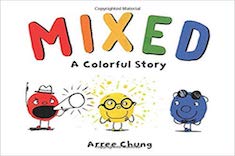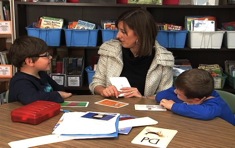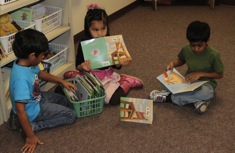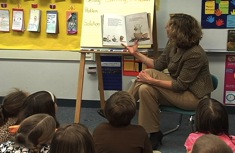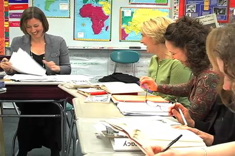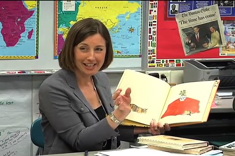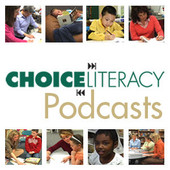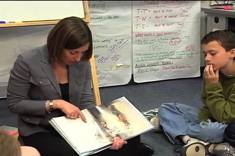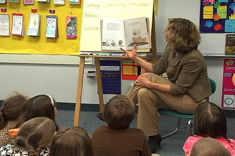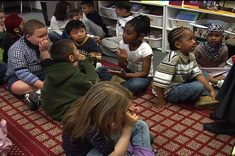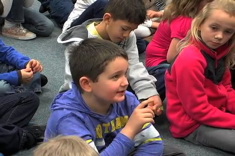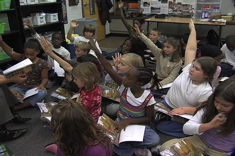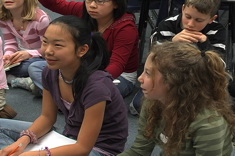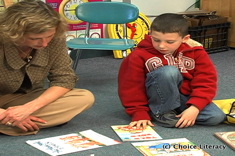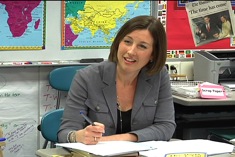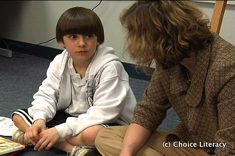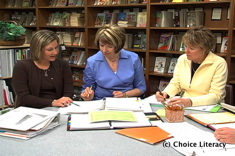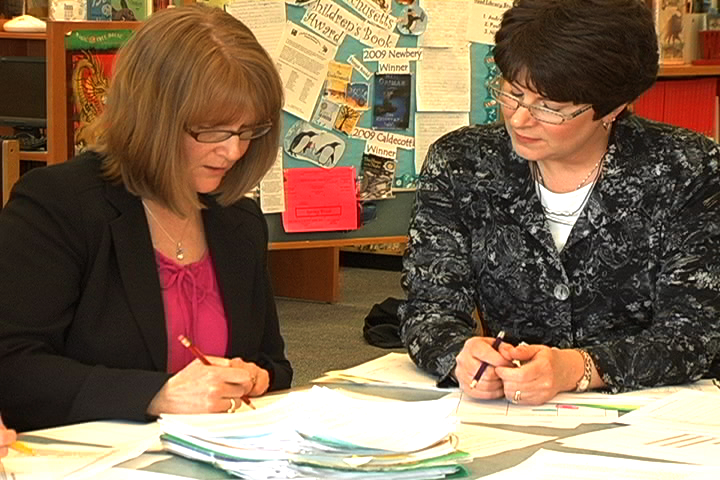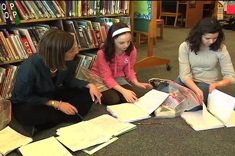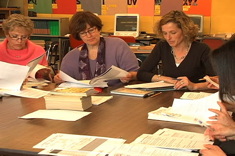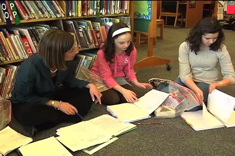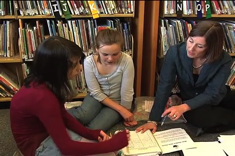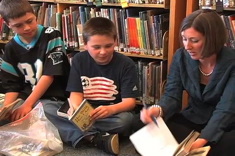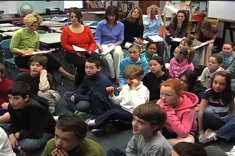Clare Landrigan
Clare Landrigan is a staff developer who is still a teacher at heart. She leads a private staff development business and spends her days partnering with school systems to implement best practices in the field of literacy and is on the board of The Book Love Foundation. She is the co-author of It’s All About the Books published by Heinemann and Assessment in Perspective, published by Stenhouse. She blogs about books and the art of teaching on her website www.clarelandrigan.com.
Latest Content
Detour Texts
Clare Landrigan and Tammy Mulligan explain the concept of “detour texts”—picture books to use as mentor texts in the intermediate grades to illustrate complex literary elements. They also share three of their favorite new children’s books to use as detours.
Mentor Texts for Letter Writing
Clare Landrigan and Tammy Mulligan share some of their favorite mentor texts for a unit on letter writing.
Voice and Choice in the Goal-Setting Process
Clare Landrigan and Tammy Mulligan take a child step by step through the process of creating a meaningful writing goal.
Putting the “Gradual” Back into Gradual Release of Responsibility
If it’s not sudden release of responsibility or no release of responsibility, what does gradual look like? Clare Landrigan and Tammy Mulligan bring this model to life.
Temporary Strategies
Clare Landrigan confers with a student and discovers that a tool designed to help the reader is actually hindering her learning. The experience causes her to reflect on the need for flexibility when matching strategy scaffolds to young readers.
Using Reading Notebook Covers for Reflection and Goal Setting
Clare Landrigan and Tammy Mulligan are using reading notebook covers in ingenious ways.
Kindergarten Small Group: Concepts of Print
Clare Landrigan leads a "quick and frequent" small group that integrates phonemic awareness activities with assessment.
Reading Workshop in Kindergarten: When and How to Launch
Clare Landrigan and Tammy Mulligan share wise advice about launching workshops in kindergarten.
Ending Reading Workshop by Planning for September
Clare Landrigan and Tammy Mulligan find that a little effort at the end of the school year pays big dividends when launching workshops in the fall.
Understanding the Summer Slide: Sharing Data with Parents and Students
Clare Landrigan and Tammy Mulligan explain why it is important to share data with parents while school is still in session in order to avoid the summer slide. This is another installment in their summer reading series.
Making Summer Reading Plans
Clare Landrigan and Tammy Mulligan have advice for making summer reading plans with students. This is the next installment in their summer reading series.
Getting Books into Students’ Hands for Summer Reading
Clare Landrigan and Tammy Mulligan share tips for getting books to students for summer reading. This is the first installment in their new summer reading series.
Previewing and Picture Walks with Fiction Texts
Clare Landrigan and Tammy Mulligan provide previewing how-to advice for grades K-2 teachers.
Eliminating the Conga Line: Teaching Young Children About Strategic Thinking
Clare Landrigan and Tammy Mulligan manage to synthesize workspace cleanup, student independence, and a concrete analogy for strategy work in classrooms.
Teaching Revision Through Talk, Routines, and Drawing
Clare Landrigan and Tammy Mulligan have some practical advice for using drawing, talk, and routines as ways into understanding writing revision for learners in the primary grades.
What to Say on Parent Teacher Night
Clare Landrigan and Tammy Mulligan present some of the anecdotes and research they would share with parents during open houses and conferences.
Building Community Protocols
Clare Landrigan and Tammy Mulligan share two of their favorite protocols for building community among educators.
Planning for a Demonstration Lesson Part 1
In this first installment of a video series, Clare Landrigan takes a team of grades 3-5 teachers through the steps of planning for a demonstration lesson.
Planning for a Demonstration Lesson Part 2
In this second installment of a two-part video series, Clare Landrigan takes a team of grades 3-5 teachers through the steps of selecting a book for a demonstration lesson.
When You Hate the Book
Abandoning a text isn't always an option (in school or life). Clare Landrigan considers her own experience as a reader and applies those lessons to the classroom.
Getting the Most Out of Visiting a Colleague’s Classroom (PODCAST)
Tammy Mulligan and Clare Landrigan talk with Franki Sibberson about strategies for getting the most out of observing in a colleague’s classroom.
Clare Landrigan and Tammy Mulligan on Assessments, Data, and Balance (PODCAST)
As the data pours in throughout the year, it’s hard to keep a sense of balance and purpose. Tammy Mulligan and Clare Landrigan chat with Franki Sibberson in this podcast about data and balance.
Clare Landrigan and Tammy Mulligan on Getting the Most Out of Grade-Level Team Meetings (PODCAST)
In this podcast, Clare Landrigan and Tammy Mulligan, the founders of Teachers for Teachers, talk with Franki Sibberson about how to link grade level team meetings with student achievement, and build stronger teaching communities at the same time.
Planning Small Groups to Teach Phonetic Skills
The gap between a child learning a phonetic rule and actually being able to apply it is one that often vexes teachers. Clare Landrigan and Tammy Mulligan find systematic planning and routines for focused small-group work help many of their colleagues succeed in their phonics instruction.
The Power of Checklists in Primary Literacy Workshops
Knowing our most sophisticated professions use checklists to get it right, Clare Landrigan and Tammy Mulligan share and explain checklists that work well for students.
Favorite Short Mentor Texts for Demonstration Lessons
For teacher leaders who are called upon to do demonstration lessons, here is a “must-have” list of short, potent books.
A More Literate Show and Tell
Tammy Mulligan and Clare Landrigan work with a kindergarten teacher to integrate literacy skill development into this favorite routine of young children.
Off the Dance Floor and Onto the Balcony: Getting the Big Picture in Schools
In the day-to-day triage of our schools and the sense of urgency that pushes us to always be accountable for every minute of the day, it is understandable that we tend to forget to pause to think about our larger goals. No one wants to “waste time.” This activity helps everyone keep the big picture in mind.
Big Ideas: Balancing Plans with Authentic Response
Clare Landrigan and Tammy Mulligan learn important lessons about planning, themes, and life when they share Knuffle Bunny with a group of kindergartners.
Whole-Group Share Sessions in Literacy Workshops: Essential Elements
Tammy Mulligan and Clare Landrigan found that even though the group share is the shortest part of the workshop, teachers reported many issues that needed attention. These issues can be resolved with attention to the framework, modeling and more.
Balancing Assessments Through Better Classroom Notes
Clare Landrigan and Tammy Mulligan explain how literacy coaches can validate and support teachers by helping them refine their classroom notetaking skills.
Relentless Consistency: Finding a Common Teaching Language Without Scripts
Sharing a common teaching vision begins with a common language, but not a script. Clare Landrigan and Tammy Mulligan share how teachers can work together to develop consistent ways of talking about literacy learning.
Ways to Avoid Coaching Traps
There are many traps for new literacy coaches that are rarely discussed. Clare Landrigan and Tammy Mulligan share the most common four they try to avoid.
Assessment Conferences: Listening to and Learning from Our Students
Research, decide, and teach – Clare Landrigan and Tammy Mulligan use Lucy Calkins’ wise advice in assessment conferences with children.
Tips for Conducting Demonstration Lessons, or How to Avoid the “Am I Doing This Right?” Question
Clare Landrigan and Tammy Mulligan have advice for teachers and literacy coaches leading demonstration lessons.
“To Teach is to Learn Twice”: Creating Professional Communities in Schools
What are the hallmarks of professional learning communities that work well in schools?
Creating a Coaching Schedule
Tammy Mulligan and Clare Ladrigan give advice on creating schedules for literacy coaches that integrate district goals and teacher interests.
Teaching Students Retelling Strategies
Retelling is an essential skill for readers, and it’s one that is crucial for success on most state exams too. In Part 1 of a two-part series, Clare Landrigan and Tammy Mulligan share strategies and sample lessons.
Draft Stamps: Moving Learners at All Levels Forward
The draft stamp is a simple tool for tracking and accountability, no matter the age of the learner.
Next Steps: Thinking about Retelling During Reading
Retelling is an essential skill for readers, and it’s one that is crucial for success on most state exams too. In Part 2 of a two-part series, Clare Landrigan and Tammy Mulligan share strategies and sample lessons in this installment.
Helping Students Deal with Distractions
Clare Landrigan and Tammy Mulligan offer lesson suggestions for helping students self-monitor and deal with distractions during literacy workshops.
Is “Just Right” Still Just Right?: Helping Children Select Appropriate Books
Clare Landrigan and Tammy Mulligan consider how the incredibly useful and widely accepted “just right” term can sometimes limit how students think about book selection and their identities as readers. This essay includes sample lessons to help expand the ways young readers think about and discuss their reading preferences.
Making Data Analysis a Motivating and Worthwhile Process
Tammy Mulligan and Clare Landrigan have ideas for staying motivated while analyzing data. If you’re drowning in assessments, there are a few lifelines in this piece.
It’s Not the Assessment — It’s How You Use It
Clare Landrigan and Tammy Mulligan discuss ways teachers can get the most out of any assessment data collected early in the year, moving beyond numbers for insights into how to structure and target instruction.
Teaching Revision to Struggling Writers
Clare Landrigan and Tammy Mulligan offer three strategies to use during writing conferences with struggling students.
Creating Data Teams
Literacy leaders are spending more and more time organizing, compiling, and storing assessment data, often leaving little time to analyze the findings with teachers. Clare Landrigan and Tammy Mulligan explain the value of enlisting tech support to assist with the data load.
Sharing Data with Families at Parent/Teacher Conferences
How can teachers use assessment data in conferences with parents, without overwhelming them with information? Clare Landrigan and Tammy Mulligan recommend a "data snippets" approach.
Tips for More Effective Debriefing Sessions
Clare Landrigan and Tammy Mulligan share strategies and seven different observation templates for participants to download and try out.
Challenging Advanced Young Readers: Harder Texts Aren’t Always the Answer
Clare Landrigan and Tammy Mulligan discuss the concept of “challenge” in considering what texts are the best fit for advanced young readers who might be able to decode any text but don’t yet have the experiences needed to tackle sophisticated concepts.
Triangulating: The Importance of Multiple Data Points When Assessing Students
No data point for any child stands alone. Clare Landrigan and Tammy Mulligan write about the importance of triangulating data when looking at student assessments, and in the process affirm the value of classroom observations.
Overcoming Slumps: Principles for Student Writers
Clare Landrigan finds she is struggling as a writer and runner. Getting out of both ruts helps her develop three simple principles for working with students in slumps.
Lessons from Family Writer’s Workshop
Clare Landrigan and Tammy Mulligan remind us that our own children are often our best teachers. Here they share all they learned from their children during a summer of writing together.
Understanding Students in Intervention Programs
Using data to make wise decisions about students who are struggling is one of the most important tasks in schools. In this series, Clare Landrigan and Tammy Mulligan take you through the process of linking data to instruction plans in intervention programs.
How Do We Talk with Parents About What It Means to Be Challenged in Reading?
Discussions with parents of precocious young readers can be tricky. Clare Landrigan and Tammy Mulligan have some tips for these conferences.
Expectations for Grade-Level Team Meetings
Tammy Mulligan and Clare Landrigan share their top tips for improving team meetings.
From Congeniality to Collegiality: Protocols for Meetings and Observations
Clare Landrigan and Tammy Mulligan suggest a few tested and successful protocols for meetings and study groups that foster more thoughtful conversations.
Structuring Coaching Conferences
Get the most of your one-on-one coaching conferences with these suggestions from Clare Landrigan and Tammy Mulligan.
Why and Watch Me: Making the Abstract Concrete for Readers
Clare Landrigan and Tammy Mulligan present some teacher question and reflection prompts for helping struggling readers understand why and how reading is a meaning-making process.
Selecting Texts for Strategy Teaching with English Language Learners in Mind
Text selection for English language learners poses special challenges. Clare Landrigan and Tammy Mulligan explain how the criteria for “just-right books” are different for ELLs, and provide practical examples of how teachers use these principles of book selection in their classrooms.
Opening Classroom Doors
Clare Landrigan and Tammy Mulligan share many nonthreatening techniques to break down resistance among teachers to classroom visits and collaboration.
Talking with Parents about Text Difficulty
Clare Landrigan and Tammy Mulligan write about how to share the research base and goal of producing lifelong readers with families in understandable terms. The article includes a handout to share at parent meetings.
What Reading is Like: Sports Analogies to Use with Parents
Clare Landrigan and Tammy Mulligan provide some sports analogies to share with families when talking about reading growth. The article includes a handout of prompts parents can use to spark discussions about books with their children.
Making Book Logs Purposeful for Students
Is the use of reading logs getting a little stale in your classroom? Clare Landrigan and Tammy Mulligan have suggestions for assessing and refreshing the activity.
The Bed and Breakfast Model: An Analogy for Schools
Have you ever struggled as a literacy leader to explain the balance between creativity and common standards in teaching; between shared expectations and individuality? Clare Landrigan and Tammy Mulligan present an analogy that might help.
From “Data Drowning” to “Data Wise”: What Are We Doing Now?
Clare Landrigan and Tammy Mulligan provide an activity for staff meetings designed to help schools sort through the purpose and value of current assessments.
Moving from Data to Practice
Clare Landrigan and Tammy Mulligan give advice for how to create databases and graphic analyses of assessment information that teachers can readily access and use.
Running and Reading Logs
In this first video in a two-part series, Clare Landrigan meets with a group of fourth graders to talk about reading logs and goals. In this excerpt, Clare uses the analogy of how runners use logs to chart progress and set goals.
Running and Reading Logs Part II
In this second video in a two-part series, Clare Landrigan meets with a group of 4th graders to talk about reading logs and goals. In this excerpt, Clare confers with students over their logs and debriefs with their teacher.
Staying Focused in Literacy Workshops
Clare Landrigan meets with a group of fifth graders to talk about what’s going well in literacy workshops, and to set individual goals.
Making Predictions and Finding Evidence in Text
In this video from a fifth-grade small group, Clare Landrigan talks with students about making predictions and finding evidence in text.
Demonstration Lesson: Inferring Character Traits
In this demonstration lesson from a 5th grade classroom, Clare Landrigan leads students through a reading and discussion of inference and character development.
Conferring About Character Traits
In this conference from a fifth-grade classroom, Clare Landrigan meets with a student to reinforce learning from a whole-class lesson on inferring and character traits.
Small Group After Demonstration Lesson
In this small group after a demonstration lesson in a 5th grade classroom, Clare Landrigan talks through strategies for inferring the meaning of new words while reading.
Quick Take: Protocols for Teacher Study Groups
In this three-minute Quick Take video, Clare Landrigan describes the teacher study group protocol she uses to foster shared understanding and allow for differentiated learning among teachers.
Browse Content By
Type
Category
- Assessment Tools
- Big Fresh Archives
- Booklists
- Choice Numeracy
- Classroom Design
- Common Core
- Community Building
- Conferring
- Content Literacy
- Digital Literacy
- English Language Learners
- Equity
- Family Relations
- Free Samples
- Guiding Groups
- Leadership
- Literacy Coaches
- Mentor Texts
- Minilessons
- New Teacher Mentors
- Podcasts
- Poetry
- Quote Collections
- Reading Strategies
- Self Care
- Struggling and Striving Learners
- Talking and Listening
- Teacher Study Groups
- Teaching Reading
- Teaching Writing
- Word Study and Vocabulary
Author
- Melissa Quimby
- Nawal Qarooni
- Gwen Blumberg
- Julie Cox
- The Lead Learners
- Hannah Tills
- Josie Stewart
- Ruth Metcalfe
- Mallory Messenger
- Becca Burk
- Jodie Bailey
- Vivian Chen
- Mary Brower
- Tiffany Abbott Fuller
- Stephanie Affinito
- Ruth Ayres
- Leigh Anne Eck
- Heather Fisher
- Shari Frost
- Julie Johnson
- Suzy Kaback
- Gigi McAllister
- Shirl McPhillips
- Melanie Meehan
- Cathy Mere
- Debbie Miller
- Tara Barnett and Kate Mills
- Tammy Mulligan
- Dana Murphy
- Bitsy Parks
- David Pittman
- Brenda Power
- Heather Rader
- Matt Renwick
- Mandy Robek
- Christy Rush-Levine
- Gretchen Schroeder
- Jen Schwanke
- Brian Sepe
- Katherine Sokolowski
- Stella Villalba
- Jennifer Vincent
Grade Level
Choice Literacy Membership
Articles
Get full access to all Choice Literacy article content
Videos
Get full access to all Choice Literacy video content
Courses
Access Choice Literacy course curriculum and training

